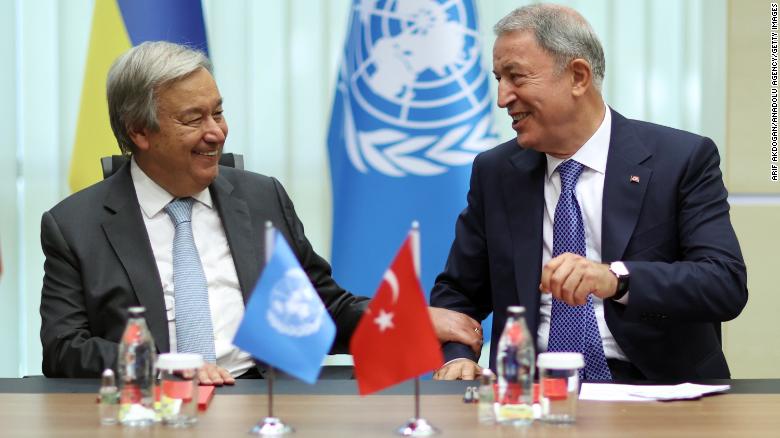Why did they inspect the first ship with Ukrainian grains in Turkey?
1:01
(CNN) --
Some 27 shiploads of grain have left Ukraine's Black Sea ports since Aug. 1 under an export deal brokered by the United Nations and Turkey, which laid "the foundation for a peaceful environment." permanent," Turkey's defense minister said in a speech on Saturday.
"Since August 1, a total of 53 ships have set sail to ship grain, 27 of which departed from Ukrainian ports," said Hulusi Akar at the Istanbul Joint Coordination Center (JCC) together with the Secretary General of the United Nations, Antonio Guterres.
The center is made up of Russian, Ukrainian, Turkish and UN officials who monitor Ukrainian grain and fertilizer exports to the Black Sea.
Where do the grains produced in Ukraine go?
Guterres, who had earlier inspected the SSI Invincible II ship on Saturday before it set sail for the Ukrainian port of Chornomorsk, said more than 650,000 metric tons of grain and other food "are already on their way to markets around the world."
Both stressed the importance of these exports as they would help overcome "the food crisis that affects the whole world, especially the drop in prices," Akar said.
advertising
Russia and Ukraine are also important suppliers of fertilizers, such as urea, potash and phosphate.
"Without fertilizer in 2022, there may not be enough food in 2023. Getting more food and fertilizer out of Ukraine and Russia is critical to further calm commodity markets and lower prices for consumers," Guterres said.
Turkish Defense Minister Hulusi Akar (right) and United Nations Secretary-General Antonio Guterres (left) held a joint press conference on Saturday.
"We are at the beginning of a much longer process, but they have already demonstrated the potential of this critical agreement for the world," Guterres added.
The groundbreaking agreement, brokered by the UN and Turkey, and signed by representatives of Russia and Ukraine in July, promised to unblock Black Sea ports to allow the safe passage of grains and oilseeds, following routes identified by Ukrainian sea pilots to avoid mines, and with stops in Istanbul to ensure that weapons are not smuggled into the country.
The food crisis
How Russia Affects Tunisia's Food Crisis 2:32
The deal followed months of diplomacy and raised hope around the world after Russia's blockade of Ukrainian ports pushed grain commodity prices to record highs this year as more than 20 million metric tons of wheat and corn from Ukraine were trapped in Odessa.
After meeting with Ukrainian President Volodymyr Zelensky and Turkish President Recep Tayyip Erdogan in the western city of Lviv on Thursday, Guterres said there were signs global food markets were beginning to stabilize in the wake of the deal.
The war has brought the world to the brink of a food crisis
He later called on developed nations to help developing countries buy grain.
"The grain movement doesn't mean much to countries that can't buy it," Guterres said in Odessa on Friday.
"It is time for massive and generous support so that developing countries can buy food from this and other ports, and that people can buy it. Developing countries need access to financing, now. They need debt relief, now." They need resources to invest in their people, now," he added.
World hunger has increased dramatically, from 135 million acutely food insecure people in 2019 to 345 million in 2022, according to the World Food Program (WFP).
It includes "50 million people in 45 countries who are knocking on the door of famine," David Beasley, executive director of the WFP, told the House Foreign Affairs Committee on July 20, while calling on other donor countries, such as the Gulf nations, to intervene to "avoid catastrophe".
The current crisis is far worse than previous food price spikes from 2007 to 2008 and 2010 to 2012, which sparked unrest around the world, including revolutions in the Middle East.
Food safety experts have warned of a huge geopolitical risk if action is not taken.
This year has already seen political destabilization in "Sri Lanka, Mali, Chad, Burkina Faso, riots and protests in Kenya, Peru, Pakistan, Indonesia...these are just signs that things are going to get worse," he said. Beasley.
CNN's Jorge Engels contributed to this report.
Food crisisWar in Ukraine







